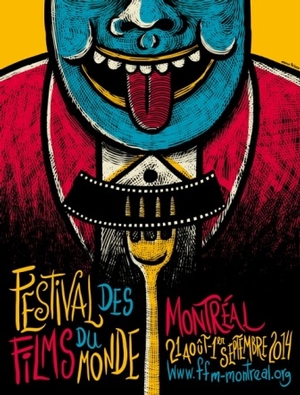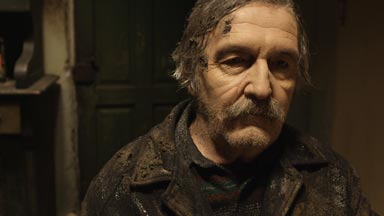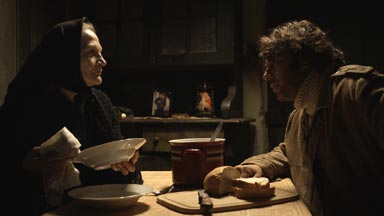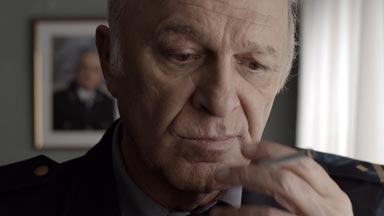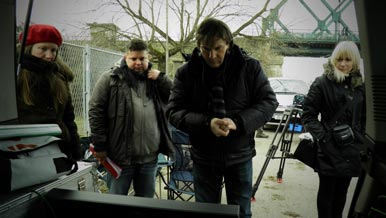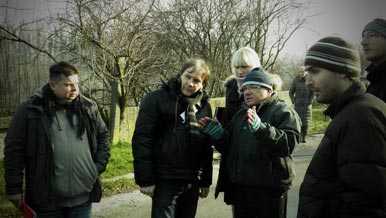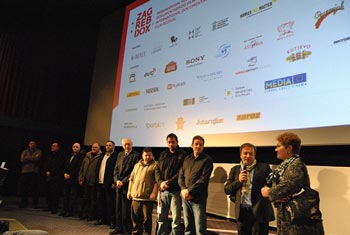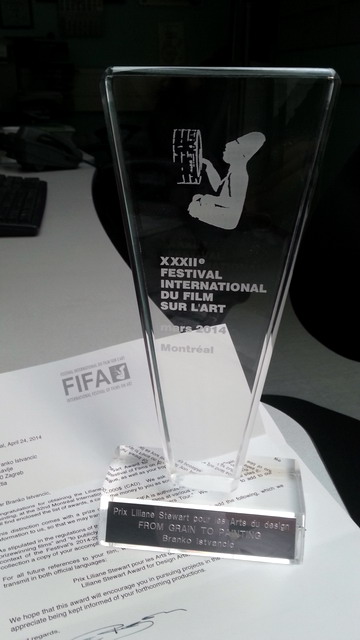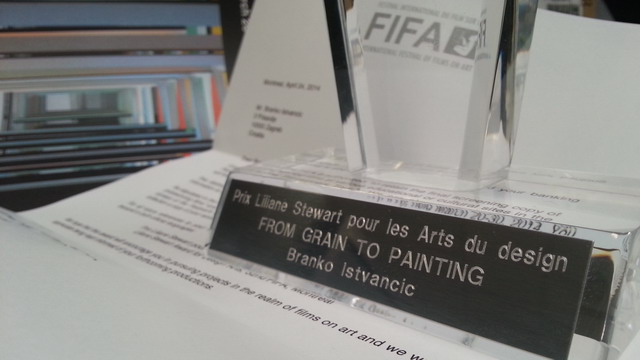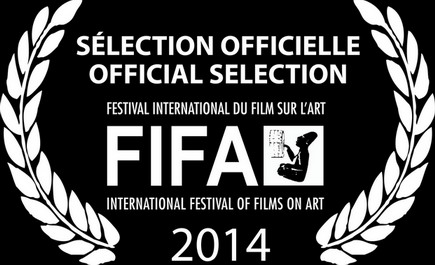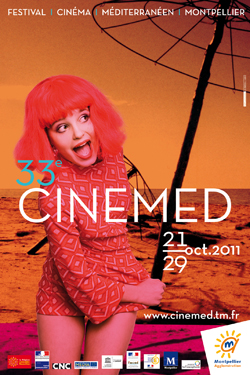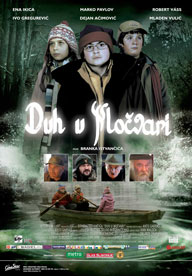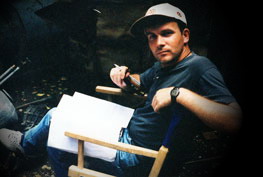
| |
| Hrvatski |
| BIOGRAPHY |
| FILMOGRAPHY |
| CURRENT PROJECT |
| PRESS |
| CONTACT |
Home
"Bridge at the End of the World" in Montreal's programme The 38th edition of the Montreal World Film Festival (Festival des Films du Monde), taking place 21 August-1 September, will present Croatian film Bridge at the End of the World directed by Branko Istvancic in the programme Focus on World Cinema. Bridge at the End of the World, directed by Branko Istvancic will be presented to the Montreal audience in CINÉMA QUARTIER LATIN 17 on Wednesday August 27, 2014 - 07:00 PM and two other projection (Thursday August 28, 2014 - 01:50 PM and Saturday August 30, 2014 - 02:40 PM). Bridge at the End of the World is based on a script written by Josip Mlakic and directed by Branko Istvancic. It focuses on unfortunate human destinies during the war in Croatia. In an atmosphere of fear, return of Serbian refugees to their homes now inhabited by Croats refuged from Bosnia, an old man disappears and the investigation of a police officer also living in a Serbian home becomes more and more personal. The director of photography was Branko Cahun, editor Veljko Segaric, and the cast includes Aleksandar Bogdanovic, Sanja Radisic, Boro Stjepanovic, Slaven Knezovic, Jelena Percin and others. The film premiered in the national competition of the recently finished 61st Pula Film Festival. The producer is Artizana film and the film was co-funded by the Croatian Audiovisual Centre, Ministry of Culture of the Republic of Serbia, and the Foundation for Cinema of Bosnia and Herzegovina. mojfilm HAVC Branko Istvancic finished his new film The new feature film directed by Branko Istvancic 'The Bridge at the End of the World' finished and selected at the Croatian 61st Pula Film Festival. Twelve films will screen in the Croatian section of the 61st Pula Film Festival running 12-26 July 2014. The film is based on the script written by Josip Mlakic, and produced by Artizana film from Zagreb (Croatia), in coproduction with Bosnia and Herzegovina (Heft production) and Serbia (Cinematographer's House). The backbone of this thriller is a quest undertaken by police officer Filip (Aleksandar Bogdanovic) for a missing old man in a village where Bosnian Croats live in Croatian Serbs' houses. When the Croatian War of Independence ended, the villages of Bosnian Croats have been destroyed, and the refugees were re-housed in the homes of Croatian Serbs who had left Croatia. Now however, the Serbian owners are returning, and the Croatian residents face an uncertain future. Anger and hostility arise. Intolerance towards the returning Serbs lurks around every corner and they are welcomed with gunfire from AK-47s. Somewhere in this atmosphere of terror, an old man called Jozo, a Bosnian Croat, disappears without a trace. The police officer Filip, who also lives in a Serbian house, is entrusted with the case. Everyone believes that a returning Serb has murdered Jozo, but Filip launches a detailed investigation, determined to be unbiased and fair, even though he has his own ghosts from the past to deal with. In his film 'The Bridge at the End of the World' Branko Istvancic gathered around thirty Croatian, Serbian and Bosnian actors, led by Aleksandar Bogdanovic, Boro Stjepanovic, Sanja Radisic, Vlatko Dulic, Nela Kocsis, Slobodan Custic, Miralem Zubcevic, Djordje Kukuljica, Jelena Percin, Anita Schmidt, Niksa Kuselj, Drasko Zidar, Slaven Knezovic and many others. Branko Istvancic is the author of the first Croatian children's film 'The Ghost in the Swamp', which achieved excellent viewer rates (was box-office hit in domestic cinemas), while his documentary films have earned recognitions at local and international film festivals. The project is financed by the support of Croatian Audiovisual Centre, with support of Ministry of Culture of Republic of Serbia in competition of minority coproduction and Film Foundation of Bosnia and Herzegovina. Statement of director: "A Bridge at the end of the world" tackles peoples' destinies in the post-war period. In a temporary refugee accommodation that in the end turns out to be permanent, in refuse containers turned into cafes where cognac is drunk from dirty glasses, unfinished houses with windows closed by plastic bags that are being visited by returning Serbs, destroyed roads swallowed by the mud. Though the people stand united in their poverty and misery, they are, however, distant from each other. In such a surrounding, in the midst of the winter and the mud, disappears an old man, who has been building a bridge on the dry land in order to make an indistinct feeling of nausea go away. This film, besides the war repercussions, tackles in a dramatic way the complex attempt of the reconciliation of the Croats and the Serbs, focusing on the little people's destinies in the chaotic times that have caught hold of the area. The film's purpose is to show the tragic destinies of the little people without unnecessary politicization, i.e., how the characters of these, only yesterday peaceful and shy people, change after the war with their neighbours and how these people cannot face the fact that the return to their past lives is impossible and that they only need to forgive and forget. I tried to visualize the destiny of the Bosnian refugees, Bosnian Croats in Croatia, who have nothing, not even the hope that they will have something sometime. All they have is the past." From Grain to Painting' in the Competition of ZagrebDox
|
Documentary Wellman awarded in Italy Documentary by Branko Istvancic 'Wellman' has been rewarded with the Special Jury Award at the Delta Film Festival in Bologna (Italy). |
|
2014 LILIANE STEWART PRIZE FOR THE DESIGN ARTS AWARDED TO FILM BY BRANKO IŠTVANČIĆ Established in 2011, the Liliane Stewart Prize recognizes the best documentary film in the design arts and is presented annually on the occasion of the International Festival of Films on Arts (FIFA) in Montreal. On March 30, 2014, the Stewart Prize was awarded to the Croatian film From Grain to Painting, directed by Branko Ištvančić. The documentary, set in the region of Ištvančić's childhood home of Tavankut, Serbia, focuses on a marginalized minority of Croatian artists forgotten by their country. The "straw girls" are anonymous artists of Bunjevci ethnicity who live in the north of the independent province of Vojvodina. They found straw to the "green" medium of choice for creating paintings, sculptures and applied-art objects as an antidote to their difficult life on the vast Pannonian plain.
A documentary about a neglected, marginalized minority in Serbia, forgotten by their country. The "straw girls" are anonymous Croatian artists of Bunjevci ethnicity who live in the north of the independent province of Vojvodina. They found straw to be the "green" medium of choice for creating paintings, sculptures and applied art objects as an antidote to their difficult life on the vast Pannonian plain. With commentary by artists Ana Milodanovic and Jozefa Skenderovic, art historian Bela Duranci, priest Andrija Kopilovic and writer Naco Zelic, the film encourages the revival of an endangered art form. Filmmaker Branko Istvancic is originally from Tavankut, the region where the film takes place. It pays special attention to the poetic atmosphere and images in the film. For Istvancic, art and life are inextricably linked. From Grain to painting in official selection of FIFA in Montreal Branko Istvancic's documentary From Grain to Painting portrays a neglected, marginalized minority in Serbia was selecteg in main competition program of the 32nd International Festival of Films on Art (FIFA) will take place this year from March 20-30 in Montreal, which includes 270 films from 34 countries, numerous special events, including exhibitions, installations, roundtables and master classes involving guest artists and specialists. In addition, the International Market of Films on Art (MIFA) is back for a fourth year in row.The "straw women" are anonymous Croatian artists of Bunjevci ethnicity who live in the independent province of Voivodine. They found straw to be the "green" medium of choice for creating paintings, sculptures and applied art objects as an antidote to their difficult life on the vast Pannonian plain. With commentary by artists Ana Milodanovic and Jozefa Skenderovic, art historian Bela Duranci, priest Andrija Kopilovic and writer Naco Zelic, the film encourages the revival of an endangered art form.
Documentary From Grain to Painting won award for the best documentary in Los Angeles Documentary From Grain to Painting by Branko Ištvančić is the recipient of the Gold Camera award for the best documentary and has been nominated for a Best of Festival award for Documentary productions in 2013 film competition of US International Film & Video Festival in Los Angeles. culturenet 'Recycling' to be screened in Turkey and Czech RepublicShort film Recycling by Branko Ištvančić will be screened in the on the official selection of 54th International Short Film Festival Brno 16 which is set to take place from 16 to 19 October in the city of Brno, as well as in the selection of Panorama - 2nd Ayvalik International Film Festival taking place from 14 to 17 November in the city Ayvalik in Turkey. Brno Sixteen is the oldest regularly running international festival of short films in the Czech Republic. This 54th year will be held in the Art cinema, Brno. In the second edition of Panorama - 2nd Ayvalik International Film Festival Oštvančić's film has been selected as the only Croatian film among 560 submitted films from around the world. 'Recycling' is about Roma family goes from the periphery to the city dump collecting goods. They found almost new garment, suit and a tie. They put clothes on their eldest son Safet and go to the most modern factory for recycling. It's Safet's first working day. The idea of this story is to show changes through recycling cycle which engages the modern Roma minority in a European city. They collect clothes which were already supposed to end at the factory for recycling, to prepare a son for a job in the same factory. culturenet Ištvančić crosses The Bridge at the End of the WorldCroatian director Branko Ištvančić, best known for children's film Ghost in the Swamp, the sixth highest local grosser in the territory with 62,785 admissions in 2006, has finished the principal photography on his new film, the thriller The Bridge at the End of the World. The film is set in a Croatian village near the Bosnian border in the late 90s, after the recent Balkan wars. Croats whose villages in Bosnia have been destroyed in the war are now living in the houses of Serbs who have been chased out of Croatia, and the Serbs are now coming back. In this complicated situation and highly charged atmosphere, Jozo, an old Bosnian Croat living in a Serbian house, disappears. The policeman Filip is in charge of the case and although everyone believes that a returning Serb has murdered Jozo, he launches a detailed investigation. Written by Josip Mlakić (The Living and the Dead), the film features a cast of Croatian, Bosnian and Serbian actors, including Aleksandar Bogdanović, Boro Stjepanović,Sanja Radišić, Slobodan Ćustić and Slaven Knezović. It was co-produced by Croatia'sArtizana Film, Serbia's Kinematografska kuća, Bosnia's Heft produkcija, and France's Dari Films. CINEUROPA 28/02/2013 - by Vladan Petković ------------------------------------------------ The Bridge at the End of the World new feature film by B. Istvancic in Montpellier The Bridge at the End of the World, new film by Branko Istvancic (director) and Irena Skoric (producer), was selected for the Development Grant at the Cinemed Festival in Montpellier, France, which is taking place on 27th and 28th October. Since 1991, the Montpellier Mediterranean Film Festival has been awarding the Development Aid Grant for feature films projects thanks to the Centre national de la cinématographie, the Ministry of Foreign Affairs, the International Organization of French-speaking Communities, the Région Languedoc-Roussillon, the Association Beaumarchais, Kodak and Laboratoires Éclair. 20 projects have been selected this year and will be presented by the directors and/or the producers in public on October 27 and 28 in front of a jury composed by professionals. The 2011 jury: Monique Carcaud-Macaire (maître de conférence en cinéma et audiovisuel, université Paul-Valéry Montpellier), Nadege Hasson (producer, Explicit Films), Béryl Peillard (screenplay writer), Philippe Faucon (director). culturenet Film visitors will be attracted by better movies, not cinema halls In this decade the most successful theater season in Croatia were 2004 with 2.98 and 2006 with 2,67 million tickets. Year 2006 is interesting because it was the year in which the audience influenced hits from non Hollywood area, as well as three national films: mostly What is a Man without a Moustache (Sto je muskarac bez brkova) by Hrvoje Hribar, The Ghost in The Swamp (Duh u mocvari) by Branko Istvancic and Border Post (Karaula) by Rajko Grlic
The most encouraging is a fact that among the best box-office results were several domestic hit films. Domestic films participate with approximately 10% in annual cinema box-office. What is a Man without a Moustache (Sto je muskarac bez brkova), a romantic comedy by Hrvoje Hribar, with 150 thousand visitors is placed second on the annual box-office report, following Borat, the global phenomenon by Sacha Baron Cohen. Among top ten there is one more domestic film - The Ghost in the Swamp (Duh u mocvari), by Branko Istvancic - the first children's film made after many years which gives us even more hope that the national cinematographic expression is expending in the right direction.
|

